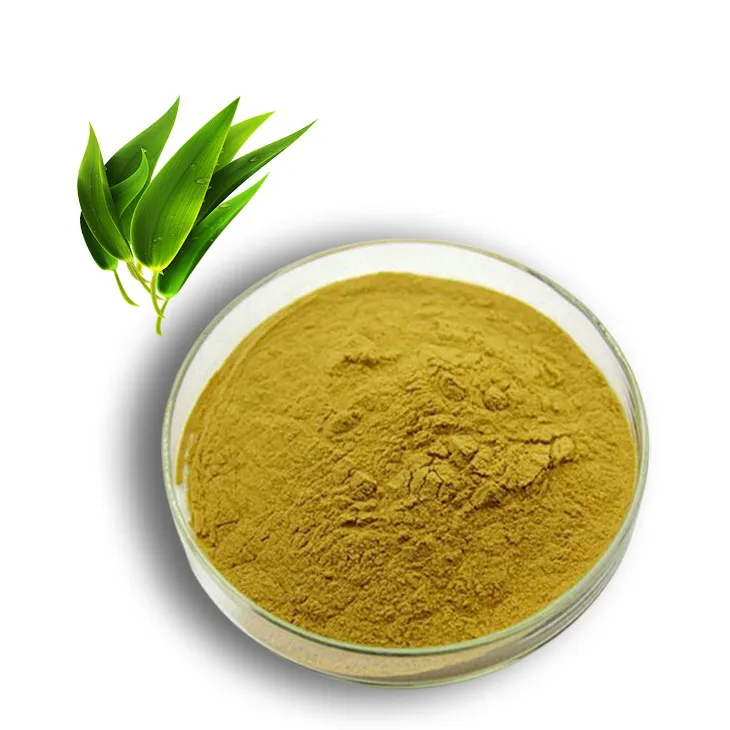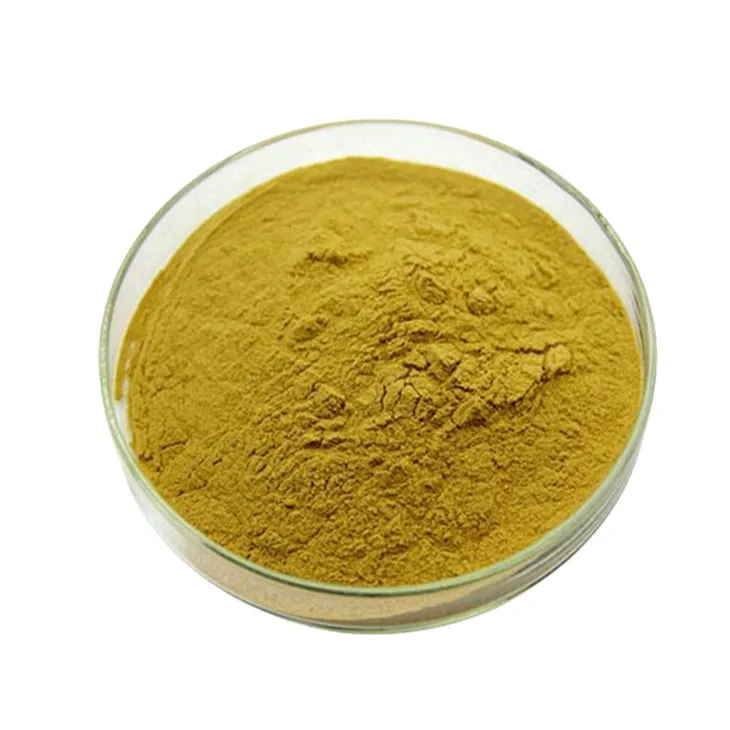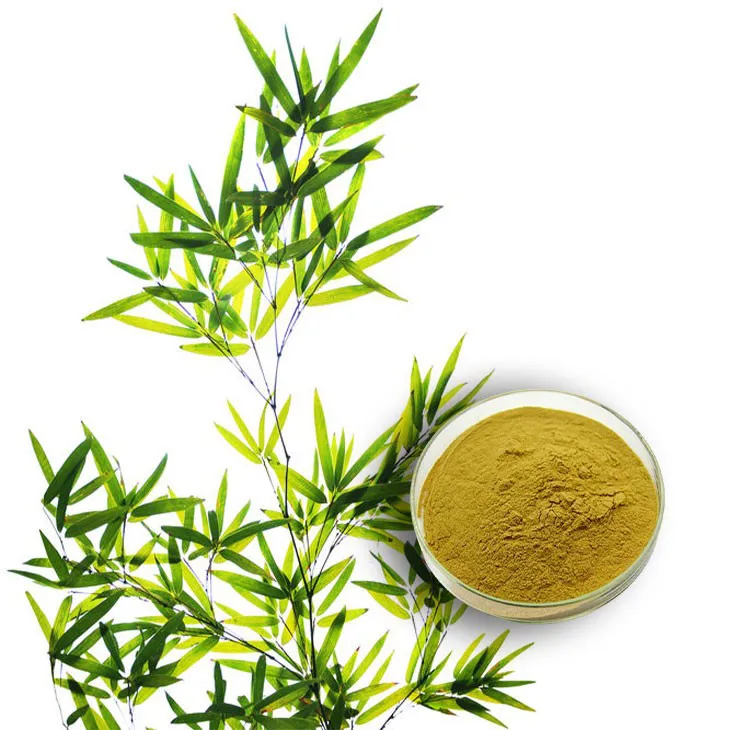- 0086-571-85302990
- sales@greenskybio.com
Use bamboo leaf extracts to prevent diseases and enhance immunity.
2024-11-13

1. Introduction
In recent years, the exploration of natural products for health benefits has been on the rise. Bamboo Leaf extract is one such natural product that has attracted significant attention. Bamboo, a plant known for its versatility and abundance in many parts of the world, has leaves that contain a rich array of bioactive compounds. These compounds are being studied for their potential in preventing diseases and enhancing the body's immunity.

2. Bioactive Compounds in Bamboo Leaf extract
Bamboo Leaf extract is a complex mixture of various bioactive substances. One of the important groups of compounds found in it is flavonoids. Flavonoids are known for their antioxidant properties. They can scavenge free radicals in the body, which are highly reactive molecules that can cause damage to cells and tissues. For example, Quercetin, a type of flavonoid present in bamboo leaf extract, has been shown to protect cells from oxidative stress-induced damage.
Another group of compounds is phenolic acids. These compounds also contribute to the antioxidant activity of the extract. They play a role in modulating various physiological processes in the body. For instance, caffeic acid can influence the activity of certain enzymes involved in inflammation and immune response.
In addition, bamboo leaf extract contains polysaccharides. These complex carbohydrates have been found to have immunomodulatory effects. They can interact with immune cells such as macrophages and lymphocytes, enhancing their function. For example, some studies suggest that bamboo leaf polysaccharides can stimulate the production of cytokines, which are important signaling molecules in the immune system.

3. Interaction with the Body's Physiological Processes
3.1. Immune System Modulation
The bioactive compounds in bamboo leaf extract can interact with the immune system in multiple ways. One of the mechanisms is through the regulation of immune - related genes. Studies have shown that certain components of the extract can upregulate genes involved in the production of antibodies. For example, flavonoids can bind to specific transcription factors in the cell nucleus, which then initiate the transcription of genes related to immune function.
Moreover, bamboo leaf extract can also influence the function of immune cells directly. Macrophages, which are important cells in the innate immune system, can be activated by the extract. Activated macrophages can better engulf and destroy pathogens. Lymphocytes, on the other hand, can be modulated in terms of their proliferation and cytokine production. For instance, T - lymphocytes may increase their production of interferon - gamma in the presence of bamboo leaf extract, which is an important cytokine for antiviral and antibacterial defense.
3.2. Antioxidant Defense
As mentioned earlier, the antioxidant compounds in bamboo leaf extract play a crucial role in protecting the body from oxidative stress. Oxidative stress occurs when there is an imbalance between the production of free radicals and the body's antioxidant defense mechanisms. Free radicals can be generated from various sources such as environmental pollutants, cigarette smoke, and normal metabolic processes.
The flavonoids and phenolic acids in the extract can neutralize free radicals by donating electrons. This antioxidant activity not only protects cells from damage but also has implications for disease prevention. For example, oxidative stress is associated with the development of many chronic diseases such as cardiovascular diseases and neurodegenerative disorders. By reducing oxidative stress, bamboo leaf extract may help prevent the onset or progression of these diseases.

4. Potential in Preventing Chronic Diseases
4.1. Cardiovascular Diseases
Cardiovascular diseases are a major cause of morbidity and mortality worldwide. Bamboo leaf extract may have several beneficial effects in preventing these diseases. One of the aspects is its role in lipid metabolism. Some studies suggest that the extract can lower blood lipid levels, particularly triglycerides and low - density lipoprotein (LDL) cholesterol. This may be due to the modulation of enzymes involved in lipid synthesis and metabolism by the bioactive compounds in the extract.
In addition, the antioxidant activity of bamboo leaf extract can protect the vascular endothelium from damage. The endothelium is the inner lining of blood vessels, and damage to it is an early event in the development of atherosclerosis. By preventing endothelial damage, the extract can reduce the risk of plaque formation and subsequent cardiovascular problems.
4.2. Cancer Prevention
The anti - apoptotic and antioxidant activities of bamboo leaf extract may also have implications for cancer prevention. Apoptosis is a programmed cell death process that is disrupted in cancer cells. Some components of the extract can inhibit the abnormal survival of cancer cells by promoting apoptosis. For example, certain flavonoids can activate caspases, which are key enzymes in the apoptotic pathway.
Moreover, the antioxidant activity of the extract can prevent DNA damage caused by free radicals. DNA damage is a key step in the initiation and progression of cancer. By scavenging free radicals, bamboo leaf extract can reduce the likelihood of mutations in DNA and thus potentially lower the risk of cancer development.

5. Research and Clinical Evidence
Although there is a growing body of research on bamboo leaf extract, more clinical trials are needed to fully establish its efficacy in disease prevention and immunity enhancement. Some in - vitro studies have shown promising results. For example, cell culture experiments have demonstrated the immunomodulatory effects of the extract on immune cells. However, translating these findings to human applications requires well - designed clinical studies.
A few small - scale clinical trials have been conducted. In one study, participants who took bamboo leaf extract supplements for a certain period showed some improvements in immune function markers. However, the sample size was relatively small, and more extensive research is required to confirm these initial findings.
6. Safety and Considerations
Generally, bamboo leaf extract is considered safe when used in appropriate doses. However, as with any natural product, there may be some potential side effects or interactions. Some individuals may be allergic to certain components of the extract. It is important to consult a healthcare professional before starting to use bamboo leaf extract supplements, especially for those with pre - existing medical conditions or those taking other medications.
In addition, the quality and purity of bamboo leaf extract products on the market can vary. It is crucial to choose products from reliable sources to ensure safety and effectiveness.
7. Conclusion
Bamboo leaf extract shows great potential in preventing diseases and enhancing immunity through its various bioactive compounds and their interactions with the body's physiological processes. While there is some evidence from research and initial clinical trials, more comprehensive studies are needed to firmly establish its benefits. As our understanding of natural products and their health - promoting properties continues to grow, bamboo leaf extract may become an important part of future strategies for maintaining health and preventing diseases.
FAQ:
What are the main bioactive compounds in bamboo leaf extract?
The main bioactive compounds in bamboo leaf extract include flavonoids, phenolic acids, and polysaccharides. Flavonoids are known for their antioxidant properties. Phenolic acids can also contribute to antioxidant and anti - inflammatory effects. Polysaccharides may play a role in modulating the immune system.
How does bamboo leaf extract upregulate immune - related genes and proteins?
The exact mechanism is still under research. However, it is believed that the bioactive compounds in bamboo leaf extract can interact with cellular signaling pathways. For example, flavonoids may activate certain transcription factors that are involved in the regulation of immune - related genes. This, in turn, can lead to an increase in the production of immune - related proteins.
Can bamboo leaf extract completely prevent cardiovascular diseases?
No. While bamboo leaf extract shows potential in preventing cardiovascular diseases through its antioxidant and anti - apoptotic activities, it cannot completely prevent these diseases. Cardiovascular diseases are multifactorial, and factors such as lifestyle, diet, and genetic predisposition also play important roles. Bamboo leaf extract may be used as a complementary approach in combination with a healthy lifestyle.
Is bamboo leaf extract safe for long - term use?
So far, research suggests that bamboo leaf extract is generally safe for long - term use at appropriate doses. However, more extensive clinical trials are needed to fully determine its long - term safety. Some individuals may be allergic to components in the extract, so it is advisable to consult a healthcare professional before starting long - term use.
How can one obtain bamboo leaf extract?
Bamboo leaf extract can be obtained through various methods. Commercially, it is often available in the form of supplements. These supplements are usually produced through extraction processes that isolate the bioactive compounds from bamboo leaves. However, it is important to ensure that the source of the extract is reliable and of high quality.
Related literature
- The Bioactive Compounds in Bamboo Leaf Extract and Their Health Benefits"
- "Bamboo Leaf Extract: A Promising Natural Immune Booster"
- "Antioxidant and Anti - apoptotic Activities of Bamboo Leaf Extract in Chronic Disease Prevention"
- ▶ Hesperidin
- ▶ citrus bioflavonoids
- ▶ plant extract
- ▶ lycopene
- ▶ Diosmin
- ▶ Grape seed extract
- ▶ Sea buckthorn Juice Powder
- ▶ Beetroot powder
- ▶ Hops Extract
- ▶ Artichoke Extract
- ▶ Reishi mushroom extract
- ▶ Astaxanthin
- ▶ Green Tea Extract
- ▶ Curcumin Extract
- ▶ Horse Chestnut Extract
- ▶ Other Problems
- ▶ Boswellia Serrata Extract
- ▶ Resveratrol Extract
- ▶ Marigold Extract
- ▶ Grape Leaf Extract
- ▶ blog3
- ▶ blog4
- ▶ blog5
-
Organic Tongkat Ali extract powder factory.
2024-11-13
-
How to make powder with ashwagandha extract.
2024-11-13
-
Rosehip extract manufacturers from China.
2024-11-13
-
The best cat's claw extract in nature.
2024-11-13
-
Chinese Dandelion Leaf Extract Suppliers.
2024-11-13
-
Gynostemma pentaphyllum extract
2024-11-13
-
American Ginseng Root Extract
2024-11-13
-
Jujube Extract
2024-11-13
-
Almond Extract Powder
2024-11-13
-
Berberis aristata Extract
2024-11-13
-
Golden Seal Extract
2024-11-13
-
Grape Leaf Extract
2024-11-13
-
Lemon Balm Extract
2024-11-13
-
Rosemary extract
2024-11-13
-
Cassia Seed Extract
2024-11-13





















